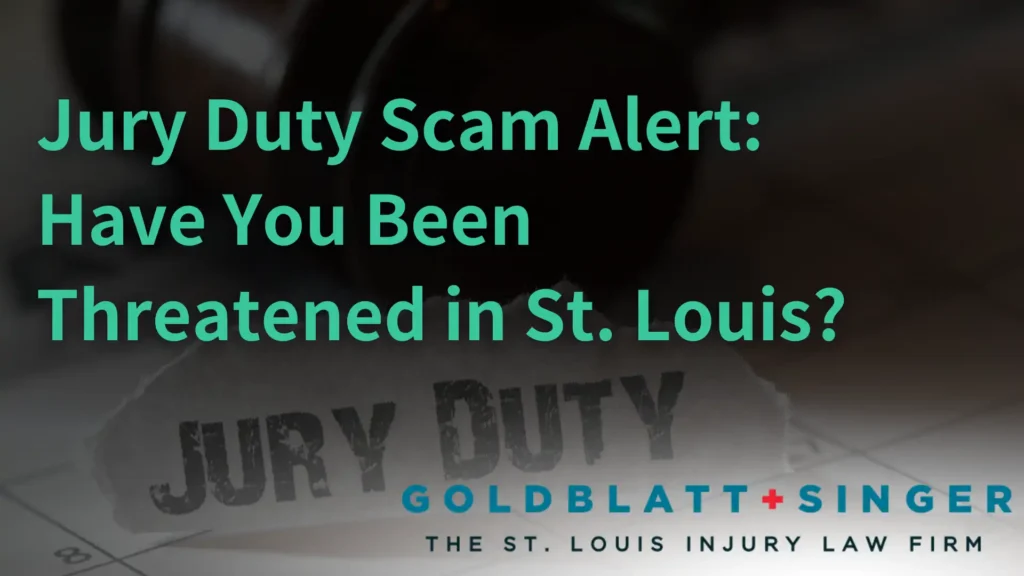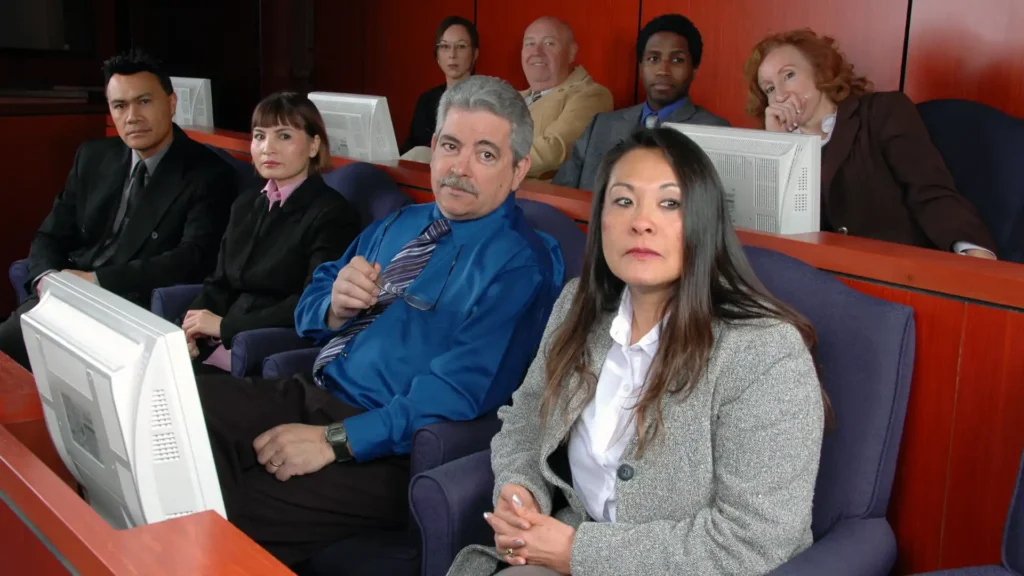
Receiving an unexpected phone call, email, or text message claiming you missed jury duty and now face legal consequences can be scary. The person on the other end may demand personal information or payment, threatening arrest or fines if you don’t comply. This alarming scenario has become increasingly common as jury duty scams proliferate nationwide. Are you a victim of a jury duty scam? At Goldblatt + Singer, our mission is to educate and protect our community from falling victim to these deceptive and unlawful schemes.
If you suspect a jury duty scam has targeted you or have questions about the legitimacy of a jury summons, contact the experienced St. Louis personal injury attorneys of Goldblatt + Singer. Our knowledgeable legal team can provide guidance, support, and representation to safeguard your rights and help you handle this challenging situation. Call us today at (314) 231-4100 or contact us online to schedule a consultation and learn how we can assist you.
Jury duty scams have become more prevalent in recent years, and scammers use increasingly sophisticated tactics to intimidate and deceive unsuspecting people. In these scams, someone claiming to be a court official, law enforcement officer, or even a judge informs the victim that they failed to appear for jury duty and now face legal consequences.
Scammers may threaten victims with arrest warrants, fines, or even jail time if they don’t comply with their demands. They often pressure individuals to provide sensitive personal information, such as Social Security numbers, birthdates, or credit card details, claiming they must verify their identity or pay a fine.
As scammers adapt their strategies, it is essential to recognize a fake jury summons letter. Legitimate jury summonses will always arrive by U.S. mail, never by phone, email, or text. They will include official court seals, contact information, and specific instructions on how to respond.
Fraudulent summonses may contain grammatical errors, misspellings, or unofficial language. They might ask you to provide sensitive information or payment via unorthodox methods, such as wire transfers or prepaid debit cards. If you receive a suspicious jury summons letter, contact your local court to verify its authenticity.
Don’t know how to tell if a jury summons is real? To protect yourself from jury duty scams, familiarize yourself with the characteristics of a legitimate jury summons:
If you need clarification on whether a jury summons is real, contact the court using the official phone number or website. Court officials will never threaten you with arrest or demand payment over the phone.
Jury duty: Is it real? Scammers often use high-pressure tactics and threats to make their jury duty scams seem more convincing. Be wary of the following red flags:
If you encounter any warning signs, hang up the phone, delete the email, or ignore the text message. Do not provide any personal information or payment.
If you receive a jury duty scam phone call, remain calm and follow these steps:
Remember, court officials will never ask for sensitive information or payment over the phone. If you need clarification on whether a call is legitimate, contact the court directly.
In most cases, courts do not send jury summonses via email. Legitimate jury duty notifications typically arrive through U.S. mail. If you receive an email claiming to be a jury summons, it is likely a scam.
Be cautious of unsolicited emails that demand personal information or payment related to jury service. Courts will not ask for sensitive details or payments via email. If you need clarification on the legitimacy of an email, contact your local court directly using official contact information
Scammers may threaten victims with jury duty warrants for failing to appear for service. However, courts typically issue warrants only after a person is adequately served with a summons and fails to appear on the designated date.
If you receive a legitimate jury summons and cannot serve, contact the court immediately to explain your situation and request an excusal or postponement. Courts are often willing to work with people who have valid reasons for being unable to serve.
To safeguard against jury summons scams, follow these best practices:
By staying informed and vigilant, you can help protect yourself and your loved ones from falling victim to these fake jury summons.

While most jury duty scams involve state or local courts, scammers may also impersonate federal court officials. These scams can be particularly intimidating, as they often involve federal charges or imprisonment threats.
If you receive a suspicious communication claiming to be from a federal court, contact the court directly using official contact information found on the U.S. Courts website.
If a jury duty scam has targeted you or you have concerns about the legitimacy of a jury summons, the experienced personal injury attorneys at Goldblatt + Singer can help. Our knowledgeable legal team can review your situation, guide you in responding, and help you protect your rights.
Don’t face the threat of federal jury duty scams alone. Contact Goldblatt + Singer today at (314) 231-4100 to schedule a consultation with one of our dedicated attorneys. Our firm is committed to helping clients with legal challenges and protecting our community from fraudulent schemes.